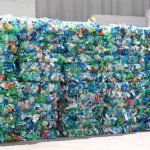There are a lot of questions about recycling plastic. Although it is advertised as being the perfect solution to pollution, is that really the case?
In reality, it is much more nuanced than that.
Plastic recycling can cause pollution, but it is still worth doing. The pros of recycling plastic outweigh the cons.
Read on to learn about the ins and outs of plastic recycling and pollution!
Does recycling plastic cause pollution?
Recycling plastic is not quite as environmentally-friendly as one might assume.
Here are some ways recycling falls short:
- Plastic recycling processes aren’t always optimized. Their inefficiency is bad for the environment.
- Volatile organic compounds get released into the air when plastic gets processed for recycling, which is harmful to humans.
- Melting plastic requires a lot of energy. This energy usage subtracts from the real positive effect of recycling .
- The fact that you can recycle plastic incentivizes people to buy it because they think recycling it is good for the planet. The truth is that you should avoid using plastic altogether.
How does recycling affect pollution?
Recycling can reduce water and air pollution.
Recycling reduces how much waste gets sent to incinerators.
Incinerators produce emissions like heavy metal and dioxins which cause global warming and acid rain.
Using recycled materials saves water and energy and creates much less water and air pollution than using raw materials.
Recycling reduces drilling and mining, which both produce water and air pollution.
How can plastic cause pollution?
Plastic is carried into the sea by rivers. Once plastic is in the ocean, it can move around the globe.
Plastic has additives to make it more durable, flexible, and strong. But these additives make plastic very hard to break down.
- Some plastics can take up to 400 years to break down!
Plastic pollution in the ocean can hurt sea animals when they ingest it, thinking it’s food. Or they can get caught in it.
What are the problems caused by recycling plastic?
There are many problems caused by recycling.
- Resin codes (the small number with the chasing arrow) don’t equal recyclability- they signal what kind of plastic was used. People mistake these for a code that the item is recyclable.
- There are thousands of different kinds of plastics. To make plastic into another product, it must be relentlessly sorted. Combining different kinds of plastic makes it useless for manufacturing.
- Just because plastic is recycled, doesn’t mean there will be a demand for the recycled plastic. Most plastic only gets processed once before going to a landfill.
- Toxic chemicals are released while processing plastic for recycling.
However, none of this means that you shouldn’t recycle your plastic!
How does plastic cause air pollution?
Most plastics are made out of oil and natural gas.
These release toxic emissions when they are extracted. Drilling for oil and gas releases a huge amount of contaminants into the air.
Several operational stages in making plastic emit pollutants.
Incineration
Because plastic takes hundreds of years to decompose, and landfills are filling quickly, plastic is often incinerated.
Over 40% of the world’s garbage is incinerated.
Burning plastic releases highly dangerous gases into the air like persistent organic pollutants, heavy metals, and other toxins.
- These chemicals have been linked to cancer, endocrine disruption, and asthma.
Off-gassing
Phthalates are added to plastic to improve heat resistance and flexibility.
However, they are connected to a slew of health concerns.
They are not chemically bound to the plastic, so they off-gas, which means they leave the plastic and enter the air.
The smell of a brand new car’s interior is the result of off-gassing.
Microplastics found in the body often come from the air we are breathing.
These microplastics are very small and can be inhaled both indoors and outdoors.
They can cause diseases.
What are solutions to plastic pollution?
There is a huge plastic pollution problem in the ocean.
At least 8 million metric tons of plastic get into the ocean every year.
Plastic pollution in the ocean impacts coral reefs, fish, seabird, whales, sea turtles, and more.
But there are solutions!
- Reduce your use of plastic that is single-use. This includes things like take-out containers, utensils, cups, plastic bags, and straws.
- Recycle properly. Learn about your city’s recycling guidelines, because if things are in recycling that aren’t supposed to be, it can contaminate the whole batch.
- Do a beach or river clean up. You can organize it yourself!
- Support bans of single-use plastic.
- Avoid products that have micro-beads. These are found in things like body washes, toothpastes, and scrubs.
- Talk to your friends and family about being more responsible consumers.
- Support organizations that are addressing plastic pollution.
Does recycling really make a difference?
Yes, recycling does make a difference.
Aluminum
It takes more energy to make new things than to recycle old products.
20 recycled cans can be made with the same energy that it takes to make only one can.
That means that if you recycle just one aluminum can, it will save enough energy to run your television for three hours.
There are also social benefits to recycling.
Cans for Habitat raises money for Habitat for Humanity. Habitat for Humanity builds affordable housing as a community effort.
Glass
Glass is one of the best materials to recycle. It can be recycled many times without its quality deteriorating. Recycled glass is actually the main ingredient in “new” glass.
Plastic
Recycling plastic makes a huge difference. Only 9% of plastic gets recycled! Recycling plastic helps keep it out of landfills, where it takes hundreds of years to break down.
Final Thoughts
There’s a lot to think about when you recycle plastic, but all in all, it is the best solution we currently have. The planet has a serious plastic pollution problem and we need to do our best not to contribute to it.


